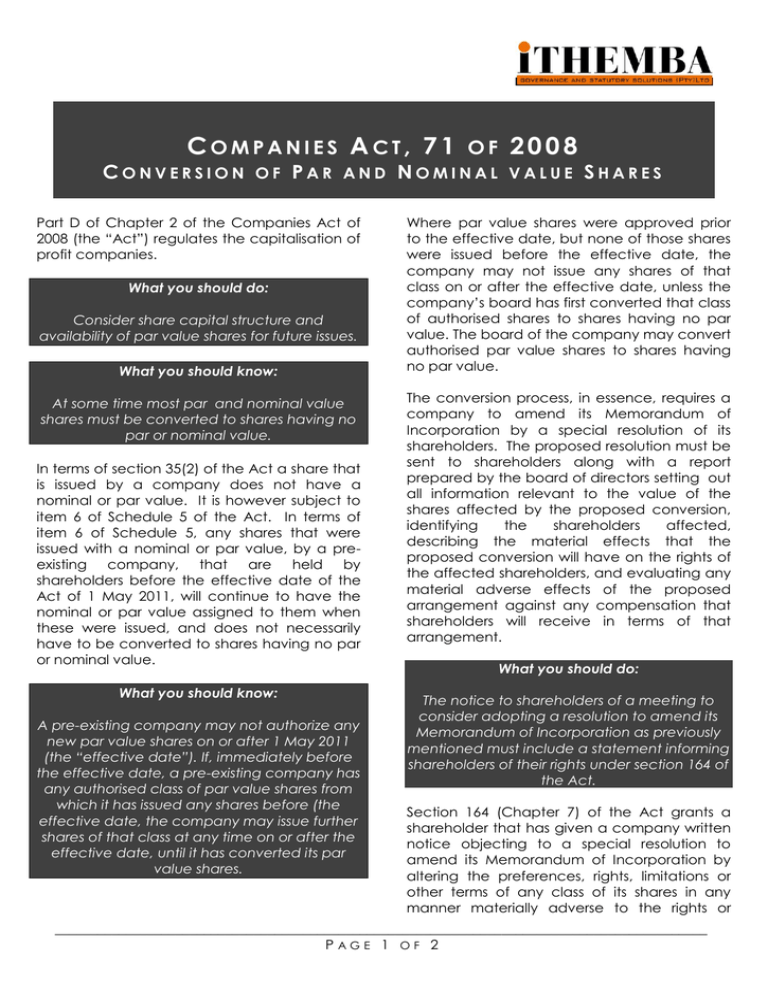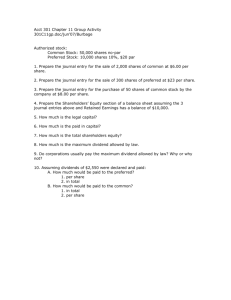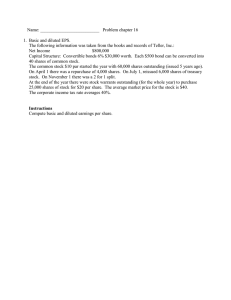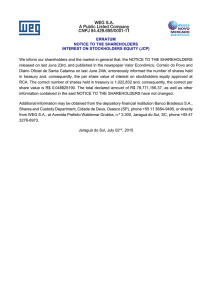Conversion of Par and Nominal value shares
advertisement

COMPANIES ACT, 71 OF 2008 CONVERSION OF PAR AND NOMINAL VALUE SHARES Part D of Chapter 2 of the Companies Act of 2008 (the “Act”) regulates the capitalisation of profit companies. What you should do: Consider share capital structure and availability of par value shares for future issues. What you should know: At some time most par and nominal value shares must be converted to shares having no par or nominal value. In terms of section 35(2) of the Act a share that is issued by a company does not have a nominal or par value. It is however subject to item 6 of Schedule 5 of the Act. In terms of item 6 of Schedule 5, any shares that were issued with a nominal or par value, by a preexisting company, that are held by shareholders before the effective date of the Act of 1 May 2011, will continue to have the nominal or par value assigned to them when these were issued, and does not necessarily have to be converted to shares having no par or nominal value. What you should know: A pre-existing company may not authorize any new par value shares on or after 1 May 2011 (the “effective date”). If, immediately before the effective date, a pre-existing company has any authorised class of par value shares from which it has issued any shares before (the effective date, the company may issue further shares of that class at any time on or after the effective date, until it has converted its par value shares. Where par value shares were approved prior to the effective date, but none of those shares were issued before the effective date, the company may not issue any shares of that class on or after the effective date, unless the company’s board has first converted that class of authorised shares to shares having no par value. The board of the company may convert authorised par value shares to shares having no par value. The conversion process, in essence, requires a company to amend its Memorandum of Incorporation by a special resolution of its shareholders. The proposed resolution must be sent to shareholders along with a report prepared by the board of directors setting out all information relevant to the value of the shares affected by the proposed conversion, identifying the shareholders affected, describing the material effects that the proposed conversion will have on the rights of the affected shareholders, and evaluating any material adverse effects of the proposed arrangement against any compensation that shareholders will receive in terms of that arrangement. What you should do: The notice to shareholders of a meeting to consider adopting a resolution to amend its Memorandum of Incorporation as previously mentioned must include a statement informing shareholders of their rights under section 164 of the Act. Section 164 (Chapter 7) of the Act grants a shareholder that has given a company written notice objecting to a special resolution to amend its Memorandum of Incorporation by altering the preferences, rights, limitations or other terms of any class of its shares in any manner materially adverse to the rights or ____________________________________________________________________________________________ PAGE 1 OF 2 interest of holders of that class of shares, as contemplated in section 37(8), and has voted against the resolution, the right to demand that the company pay to such dissenting shareholder the fair value for all the shares of the company held by that dissenting shareholder. The necessary procedural requirements must be met in this regard. Dissenting minority shareholders have therefore been granted a valuable right to force the sale of their shares in certain circumstances. If compliance with section 164 would result in a company being unable to pay its debts as they fall due and payable for the ensuing 12 (twelve) months, then the company may apply to court for an order varying its obligations, but the court must ensure that the dissenting shareholders are paid at the earliest possible date compatible with the company satisfying its other financial obligations. What you should do: Section 51 contains requirements in respect of the registration and transfer of certificated securities and should be adhered to by companies. A failure of any share certificate issued by a pre-existing company to satisfy the requirements of sections 51 (1) to (4) is not a contravention of that section and does not invalidate that share certificate as contemplated in item 6(4) of Schedule 5 of the Act. It is obvious from the above that the provisions of the Act will in due course have a material impact on the share capital of the company and all companies will be well advised to consider the best way forward in this regard rather sooner than later. NEED ASSISTANCE WITH THE IMPLICATIONS OF THIS ACT? The risk of having to pay shareholders an undefined amount of money when amending the Memorandum of Incorporation in respect of the shares makes the planning extremely difficult. Unless the risk of appraisal rights being exercised can be clearly quantified, a company will be uncertain in many instances whether it will be called upon in terms of section 164 of the Act and, if so, the amount of its financial obligations which will arise as a result thereof. This makes the evaluation of the amendment, and the raising of the requisite amount of finance in order to fund a transaction, more complex. Monument Office Park, Block 5, Suite 102, 79 Steenbok Avenue, Monument Park Tel: 086 111 1010 Fax: 086 604 1315 e-mail: avdm@ithembaonline.co.za website: www.ithembaonline.co.za What you should know: Experience isn’t Expensive... it’s Priceless The Regulations to the Act also became effective on 1 May 2011. Regulation 31 must be taken into account by companies in respect of the conversion of nominal or par value shares, and related matters. CONTACT: Disclaimer: This document is provided for information purposes only and should not be regarded as a comprehensive and complete note on the content of the Companies Act, 71 of 2008, as amended. It does not constitute legal advice or legal opinions. Readers are strongly advised to seek legal advice of competent legal counsel in the event of any matter herein addressed being applicable to or of relevance to the reader’s specific circumstances. iThemba Governance and Statutory Solutions (Pty) Ltd, its employees, agents or others that provide information will not be liable or responsible for any claim, loss, injury, liability or damages related to any use of the content of this advisory note. ____________________________________________________________________________________________ PAGE 2 OF 2


